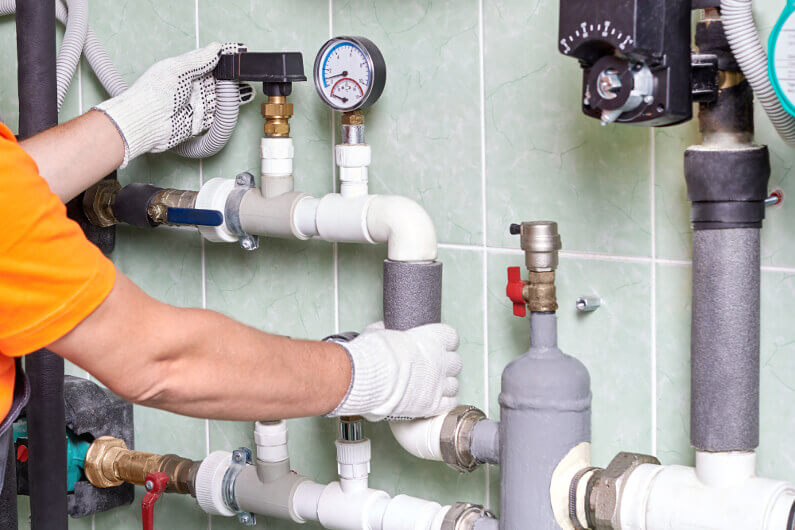Plumbing, an indispensable facet of infrastructure, is a labyrinth of pipes and fixtures that ensures the seamless flow of water and efficient waste disposal. Residential and commercial plumbing, although sharing the foundational principles of plumbing, exhibit stark differences in scale, complexity, and purpose. This article endeavors to illuminate the distinctive features that set residential and commercial plumbing apart, guiding readers through the intricate web of pipes that sustain our daily lives.
Scale and Complexity:
- Residential: Residential plumbing systems are characterized by their modest scale, serving individual households. These systems are generally less complex, designed to handle the needs of a limited number of occupants.
- Commercial: In stark contrast, commercial plumbing operates on a grander scale, catering to businesses, institutions, and industrial facilities. The complexity of these systems is heightened to meet the demands of larger structures and a higher volume of users.
Usage and Demand:
- Residential: The focus of residential plumbing lies in meeting the day-to-day needs of households, including bathing, cooking, and laundry. The demand is relatively consistent and predictable.
- Commercial: Commercial plumbing, on the other hand, must contend with a significantly higher usage and demand. From public restrooms and expansive kitchens to specialized industrial applications, the system must be designed to handle a diverse range of activities.
Fixture and Appliance Differences:
- Residential: Residential plumbing fixtures are tailored to the standard needs of households and include items such as toilets, sinks, and showers.
- Commercial: Commercial plumbing incorporates heavy-duty fixtures and appliances designed to endure the rigors of frequent use. These may include industrial-grade sinks, urinals, and specialized equipment for commercial applications.
Water Heater Capacity:
- Residential: The water heaters in residential plumbing systems are generally smaller in capacity, sufficient for the needs of a single household.
- Commercial: Commercial settings necessitate larger, high-capacity water heaters capable of meeting the demands of multiple users simultaneously. This is essential for maintaining a consistent supply of hot water during peak usage times.
Pipe Size and Material:
- Residential: Pipes in residential plumbing systems are typically smaller and made of materials such as copper, PVC, or PEX to accommodate the lower volume of water flow.
- Commercial: Commercial plumbing requires larger pipes, often constructed from more robust materials like cast iron or stainless steel. These materials ensure durability and can withstand the increased water flow associated with larger-scale applications.
Regulatory Compliance:
- Residential: Adherence to local building codes and regulations is crucial for residential plumbing to ensure the safety and well-being of occupants.
- Commercial: Commercial plumbing must comply with more stringent codes and regulations due to the potential impact on public health and safety. The scale and complexity of commercial systems demand a higher level of regulatory scrutiny.
Maintenance and Repairs:
- Residential: Maintenance and repairs in residential plumbing are generally simpler and can often be managed by individual homeowners or local plumbers.
- Commercial: Commercial plumbing requires a specialized approach to maintenance and repairs. The complexity of systems and the potential impact on business operations necessitate the expertise of a professional team equipped to handle large-scale issues promptly.
Cost Factors:
- Residential: Residential plumbing systems typically incur lower initial installation and maintenance costs due to their smaller scale.
- Commercial: The initial investment for commercial plumbing is higher, reflecting the scale and complexity of the systems. However, economies of scale may contribute to reduced long-term costs.
FAQs:
Q1: Can residential plumbers work on commercial projects?
A1: While residential plumbers may possess some skills applicable to commercial projects, the complexity of commercial plumbing often requires specialized knowledge and experience.
Q2: Do commercial buildings require more frequent plumbing inspections?
A2: Yes, due to the higher usage and potential impact on public health, regular and thorough inspections are crucial for maintaining the integrity of commercial plumbing systems.
Q3: Can residential plumbing fixtures be used in commercial settings?
A3: Not advisable. Commercial settings demand more robust fixtures designed to handle increased usage and potential stress.
Q4: Are there specific certifications for commercial plumbers?
A4: Yes, commercial plumbers may need additional certifications to comply with industry standards and regulations. These certifications ensure they are well-versed in the complexities of commercial plumbing systems.
Q5: Can a residential plumber handle a small commercial project?
A5: Depending on the complexity of the project, a residential plumber may be able to handle small commercial assignments. However, expertise in commercial plumbing is preferred for larger and more intricate projects.
Conclusion:
In navigating the labyrinth of plumbing intricacies, understanding the differences between residential and commercial plumbing is paramount. From the scale and complexity of the systems to the materials used and regulatory requirements, these distinctions guide the decisions of plumbers, contractors, and property owners. Appreciating these disparities ensures that plumbing systems, whether at home or in commercial spaces, function optimally, providing the lifeblood that sustains our daily lives.

A group of home improvement enthusiasts and bathroom design experts, combines in-depth knowledge and a shared passion to deliver engaging, informative content that guides readers through the world of bathroom innovation and style.

Leave a Reply